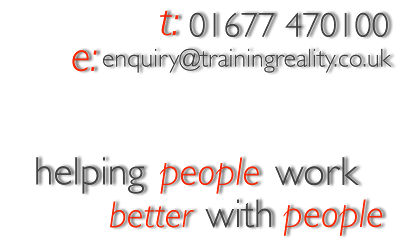Please press (at least!) one of these.
It costs you nothing, and (possibly) helps us spread the word!
Getting to Yes!
Wednesday, 5 August 2009
Time to start with an apology - this blog entry is not specifically about Roger Fisher’s book of the same title (which is about much more principled negotiation), but it’s about certain sales people taking a rules-based and un-principled approach to selling - not only unpleasant, but, particularly with regards to business-to-business sales, will become increasingly unsuccessful.
There is a model of sales training doing the rounds at the moment (which uses some limited and rather out-of-context NLP theory) that, during a sales call, you need to get the potential client to start saying yes, to pretty much anything. The simple idea behind this is that you move the potential client into a mindset of saying yes, so that there is less resistance when the sales person goes to close the deal.
I touched on this subject in my blog on the 24th July (motion creates emotion, here), which reference to the film Boiler Room. It’s a pretty apt way to look at it, because it is still heavily used in domestic cold-calling (double glazing, insurance, utilities, financial products and so on), and one can only assume that it has some success, given the evidence of its continuing prevalence.
However, putting aside the morality issue for a moment (although I will go on record to say that I think companies using this approach tend to have the morality of the Boiler Room management!), I want to write about two specific business-to-business (B2B) instances where the basic principle of getting the potential client to say yes simply didn’t work.
Both instances were cold calls, to extract some marketing money from trainingreality. Both salespeople had been on a similar course, where the introductory part of the pitch was about getting to yes. This led to some wonderful (wonderfully bad!) rhetorical questions:
“If I could show you a way to increase your sales leads by x%, would you be interested?”
“Are senior HR managers with big training budgets the sort of people you’d like to meet?”
“Are you interested in getting a great return on your marketing spend?”
“Do you think it might help to get one-on-one time with the heads of the biggest UK plcs?”
Now, as a simple soul, I would find it tricky to honestly say “no” to any of those statements, hence the rhetorical aspect to them, and the fact that they are built into many, many sales pitches these days. But, being (I hope), a slightly less-than-simple businessman, I’m not naive enough to fail to see these things coming a mile off, and I don’t think that the majority of business people are.
What has happened here is that a simple rule has been derived from some complex and much more thorough theories, and mis-applied. As usual, when this happens, the outcome (in anything other than the very short-term) will not be what was planned. The underlying principles are to get the potential clients to a positive mindset, to help them understand the benefits of working with you, and to show them how you can help them achieve their objectives. Mindless rhetorical questions will not work, and in many cases (mine included!) will only serve to put people off.
Quality sales training needs to be much more sophisticated than this - it’s about building rapport, being principled, communicating clearly, and listening well. Each of these looks and sounds simple, but they are not - they’re about much deeper level change than a simple script to follow.
Please press (at least!) one of these.
It costs you nothing, and (possibly) helps us spread the word!





